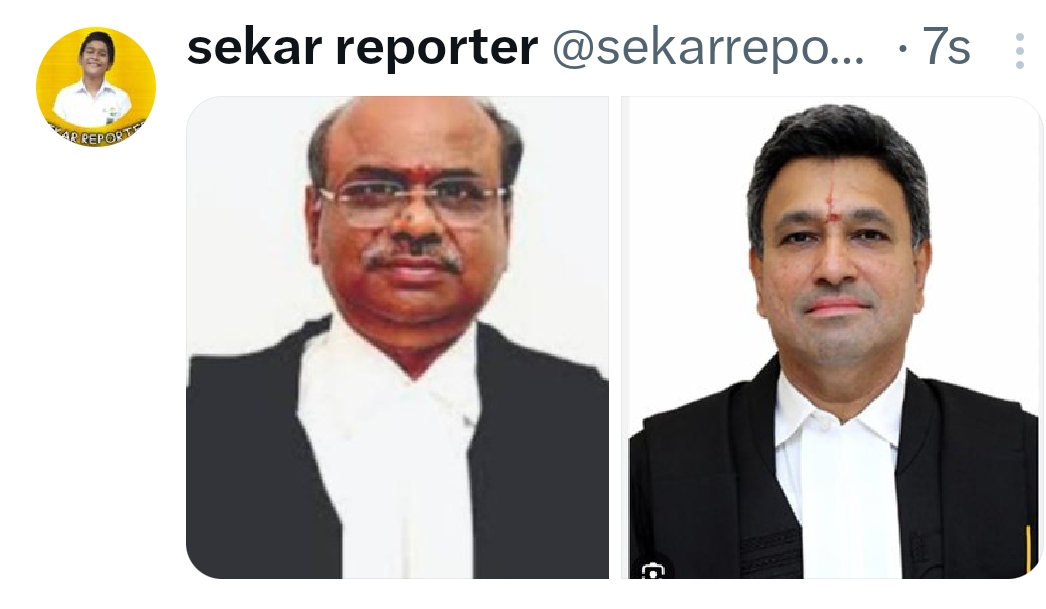W.P.No.25287 of 2024
THE HON’BLE ACTING CHIEF JUSTICE
AND P.B.BALAJI,J.
(Order of the court was made by the Hon’ble Acting Chief Justice)
The petitioner has filed this writ petition seeking issuance of a
writ of mandamus commanding the second respondent to issue Scheduled Tribe Community Certificate [Kattunayakan] to the
petitioner, based on her appeal dated 30.9.2023.
- When the matter was taken up today, Mr.A.Edwin Prabakar, learned State Government Pleader, on instructions, submitted that the appeal filed by the petitioner was rejected by the second respondent by proceedings dated 20.8.2024, on the grounds that: (i) As per G.O.Ms.61, dated 4.4.2005, the petitioner has to apply for issuance of community certificate only in the native district, where her parents or ancestors resided; and (ii) the parents, bloodrelatives or relatives of the petitioner are not native residents of Tiruvannamalai District. Eventually, the petitioner was directed to seek appropriate relief before the competent authority in her native district.
- Learned counsel for the petitioner submitted that the petitioner married one Vasanth, who is a resident of Tiruvannamalai District; her father was issued a community certificate by the Tahsildar, Wallajah, Vellore District, on 16.9.21989; and the petitioner’s own sister, S.Hemavathy, was issued a community certificate by the Revenue Divisional Officer, Ranipet District. Despite furnishing such documents to fortify her claim, the third respondent/Revenue Divisional Officer, Tiruvannamalai District, rejected the plea of the petitioner and the same was affirmed, on appeal, by the second respondent/District Collector for reasons
which cannot be countenanced. - Learned counsel for the petitioner further submitted that the appeal filed by the petitioner on 30.9.2023 was rejected by order dated 20.8.2024 of the second respondent, after lapse of almost one year and such delay is fatal, inasmuch as the petitioner is unable to claim the benefits which her father, sister and ancestors have availed. The order passed by the second respondent after lapse of one year since filing of appeal, directing the petitioner to
approach the competent authority in Ranipet District, is
unsustainable, and the petitioner is made to run from pillar to post
to seek the benefit which she is genuinely entitled to. - We have heard learned counsel on either side and perused
the order dated 20.8.2024 passed by the second respondent. - In the normal course, though we would not have
entertained the writ petition inasmuch as the appeal filed by the
petitioner has been rejected by the second respondent on 20.8.2024, but, of late, we have noticed that a large number of applicants seeking issuance of community certificate are
approaching this court challenging identical orders passed by the District Collectors of various districts. - The primary purpose of issuing community certificate is to uplift the marginalised communities by ensuring access to education and employment. The State of Tamil Nadu is known to be the
frontrunner to offer cutting edge solutions for governance. Despite availability of the state-of-the-art technology, if no relief is granted to an applicant betimes and if the applicant is made to run from pillar to post, then the only solution is to combat the red-tape and
simplify the entire procedure. - In the case on hand, the specific case of the petitioner is that her father and sister have been issued community certificates to the effect that they belong to Scheduled Caste Community [Kattunayakan]. The case of the petitioner, prima facie, appears to be genuine. Even then, for the reasons stated herein above, the second respondent rejected the appeal after well-nigh one year and directed the petitioner to approach the competent authority in Ranipet District.
- We are of the firm view that, in the interest of the public at large, the red-tape has to be eased. By leveraging technological advancements, government can streamline the process and improve efficiency in administration. In the case on hand, the petition/ appeal has been filed by the petitioner on-line, but the same was rejected stating that the petitioner’s parents, ancestors are not native residents of Tiruvannamalai District. The entire process involved in verification and subsequent issuance of the community certificate should also be simplified by creating centralised online
platforms for the citizens to have easy access to such facilities. - In such view of the matter, we direct the first respondent to chalk out a method, bearing in mind the following directives of
this Court:
(i) The process of applying for community
certificate; verifying of the communal status; and, issuing of community certificate shall be
centralized by creating a common portal governing the entire State of Tamil Nadu, thereby enabling the applicant to apply to the authority concerned in the district he/she
resides, without relegating him/her to the native
district;
(ii)The aforesaid facility should also make a
provision enabling the competent authority in the other district to verify/enquire qua the communal status of the applicant based on the communal status of her parents or siblings or ancestors who resided in that district, even if the applicant is presently residing in a district other than her
native district; and
(iii)A time schedule should be fixed for conclusion of
the entire procedure, without causing any
unnecessary delay, so as to enable the applicant, who belongs to the marginalised community, to
have access to education and employment
opportunities betimes. - Learned State Government Pleader sought time to take instructions qua the implementation of the aforesaid directives issued by this Court.
- List the matter on 12.9.2024, immediately after admission
cases.
(D.K.K., A.C.J.) (P.B.B., J.)
03.09.2024
sasi
THE HON’BLE ACTING CHIEF JUSTICE
AND
P.B.BALAJI,J.
(sasi)
W.P.No.25287 of 2024
03.09.2024
